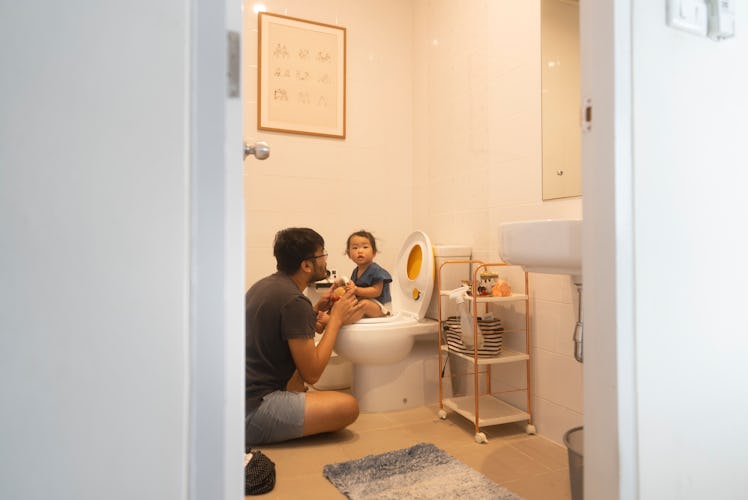How To Succeed At Night Time Potty Training
Night Time dryness is the final step in the potty training process, and it doesn’t always come easy...or quickly.

After you complete nearly every level of the potty training game, defeating the final boss of night time potty training can be quite the challenge. Your child has mastered staying dry during the day, pooping and perhaps even wiping themselves. But unlocking the grand prize of potty training at night rarely comes quickly. So what can parents do to make the process go as smooth as possible?
When Can I Start Night Time Potty Training?
Staying dry through the night typically takes longer for kids to master than having accident-free days because nighttime potty training is contingent mainly on physiological development. “Whether or not their body is physically able to hold the urine long enough to wait until the morning to eliminate is the biggest factor in nighttime potty training,” explains Jazmine McCoy, Psy.D., clinical psychologist and founder of The Mom Psychologist.
“You want to make sure they are showing signs of readiness like having very few accidents during the day and success at keeping dry during nap time. You’re looking for successive days in a row where they are waking up with a dry diaper or pull up.”
McCoy assures parents that they shouldn’t feel pressured to rush into nighttime potty training. “It takes time,” she emphasizes. “I would say to wait at least six months after your child is fully daytime trained to start thinking about transitioning to nighttime training.”
What Makes Potty Training At Night Successful?
In her book The First Time Parents Guide to Potty Training, McCoy stresses the importance of building a routine. She suggests having your child attempt to potty 30 minutes before bedtime and again then right before bed. “Use some of those ‘when-then’ statements,” she advises. “When you go potty, then we can read our books. Eventually, it will create a natural transition.”
Ensuring your child’s bladder is as comfortable as possible is also an important consideration. Juices and drinks that contain food dye can irritate your child’s bladder and contribute to bedwetting. “You don’t have to eliminate liquid before bed,” says McCoy. “But you do want to work on staying away from juices for at least two hours before bedtime.”
A hidden factor in nighttime potty training is constipation, which can put additional pressure on the bladder and contribute to accidents. Paying attention to the size and frequency of your child’s poop isn’t just about bragging rights. It can also tip you off to why they may be having accidents.
But since potty training differs so much from kid to kid, one of the most helpful things you can do for your child is managing your own expectations so that both you and your kid can take setbacks in stride. “Be prepared for accidents because they will happen,” says McCoy.
She suggests double lining your kid’s mattress to ease the pain of middle-of-the-night accidents. Start by lining the mattress, putting a sheet over the lining, and then add a second lining and sheet over the original layers. This makes for much smoother bed changes when you are groggy and your child is wet and uncomfortable.
When Should I Be Concerned?
While most kids are nighttime trained by age 5, McCoy notes that bedwetting still occurs in 20% of 5-year-olds and 10% to 15% of 6-year-olds. As kids enter grade school, the primary concern then is as much social as it is physical.
“I think more about the older children who are struggling with bedwetting because they can start to impact their self-esteem and their confidence.” explains McCoy. If your grade-schooler struggles with bedwetting, it’s crucial to treat your child with increased compassion and sensitivity amid any frustrations you’re experiencing, she says. “It’s essential for parents to keep that in mind as they talk with their child about nighttime training, or else it can be tied to a lot of shaming and feeling like an outsider.”
While your primary goal may be for your child to stay dry at night so that all of you can get more sleep, helping them maintain a healthy self-image along the way is one of your foundational parenting tasks. It can be a complicated dance if the process lingers on. Your ability to encourage them through the setbacks will help your child in the present while paying dividends in the future.
This article was originally published on